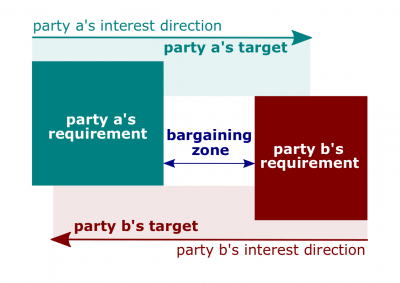Difference between revisions of "Distributive bargaining"
(→Related coursework) |
|||
| (4 intermediate revisions by the same user not shown) | |||
| Line 1: | Line 1: | ||
| − | [[File:Bargaining-zone.png|400px|thumb|right|[[Distributive bargaining]]]][[Distributive bargaining]] (hereinafter, the ''Bargaining'') is [[negotiation]] that seeks to divide up a so-called [[fixed pie]] or limited amount of resources; a win-lose situation. | + | [[File:Bargaining-zone.png|400px|thumb|right|[[Distributive bargaining]]]][[Distributive bargaining]] (hereinafter, the ''Bargaining'') is [[negotiation]] that seeks to divide up a so-called [[fixed pie]] or limited amount of resources; a win-lose situation. |
==Definitions== | ==Definitions== | ||
According to [[Organizational Behavior by Robbins and Judge (17th edition)]], | According to [[Organizational Behavior by Robbins and Judge (17th edition)]], | ||
:[[Distributive bargaining]]. Negotiation that seeks to divide up a fixed amount of resources; a win-lose situation. | :[[Distributive bargaining]]. Negotiation that seeks to divide up a fixed amount of resources; a win-lose situation. | ||
| + | According to [[Labor Relations and Collective Bargaining by Michael R. Carrell and Christina Heavrin (10th edition)]], | ||
| + | :[[Distributive bargaining]]. A negotiation method described as a "win-lose" situation, in which resources are viewed as fixed and limited, and each side wants to maximize its share. | ||
==Related lectures== | ==Related lectures== | ||
| − | *[[ | + | *[[Market Intercourses Quarter]]. |
[[Category: Septem Artes Administrativi]][[Category: Articles]] | [[Category: Septem Artes Administrativi]][[Category: Articles]] | ||
Latest revision as of 00:44, 14 June 2023
Distributive bargaining (hereinafter, the Bargaining) is negotiation that seeks to divide up a so-called fixed pie or limited amount of resources; a win-lose situation.
Definitions
According to Organizational Behavior by Robbins and Judge (17th edition),
- Distributive bargaining. Negotiation that seeks to divide up a fixed amount of resources; a win-lose situation.
According to Labor Relations and Collective Bargaining by Michael R. Carrell and Christina Heavrin (10th edition),
- Distributive bargaining. A negotiation method described as a "win-lose" situation, in which resources are viewed as fixed and limited, and each side wants to maximize its share.
